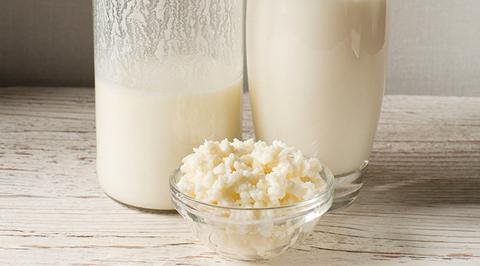NEEDED:
1 TBS White curd-like starter grains
1 cup of milk (raw or organic whole)
One pint size glass jar with plastic lid or use coffee filter/rubber band to cover
One plastic mesh strainer
DIRECTIONS:
Pour milk into glass jar
Add starter grains
Cover with plastic lid (or coffee filter/rubber band).
Sit on countertop out of direct sunlight for 18 hours.
18 hours later…
It will look creamy at top, liquidy in the middle, and grains at the bottom.
Pour contents through strainer into a glass jar (if you plan on storing in fridge) or in glass cup (if you plan on drinking now.
Grains will be left in your strainer.
Put leftover grains in your jar and add a new cup of milk to repeat the above process on the countertop.
Grains will eventually double in size.
*NOTE: if left out too long (24 or more hours), it is best to make cheese out of it or use it in a smoothie because it won’t taste good just drinking it.
TO FLAVOR YOUR KEFIR:
Add real fruit or sliver of rind of a citrus to the strained kefir.
Let sit for 2 hours before drinking. Strain it before drinking if you prefer no clumps.
Longer fermenting gives you a more tangy taste.
Longer fermenting soaks up more sugar from the milk.
TO TAKE A BREAK FROM FERMENTING:
Just put your grains in a small jar and cover them with milk (app ½-1 cup) and keep them in the fridge. They will stay dormant for up to 7 days before you need to add more milk.
Milk kefir (pronounced KEE-Fur) is a fermented milk drink that has been around for thousands of years. According to Donna Schwenk, author of Cultured Foods for Life, “People in the Caucasus Mountains maintain that kefir is the reason for their legendary longevity. In Turkey, scrolls from Abraham declared that his long life was due to fermented milk products. Muhammad professed that kefir grains were a gift from Allah to him. And Noah claimed to have gotten these grains from angels on the ark. “
Homemade kefir is similar to runny greek yogurt, but it’s NOT yogurt. It actually has between 30-56 strains of good bacteria (also called Probiotics), while yogurt only has 7-10 strains and Water Kefir only has 10 strains. The bacteria in yogurt pass through the body within 24 hours with the main job of sustaining the good bacteria that already reside in the digestive tract. Kefir, however, stay IN the digestive tract – putting up a stake and creating its own colony where it’s needed. It heals up the damaged gut where candida yeast, antibiotics, or toxins have entered & destroyed all the good bacteria colonies.
Why gut health is so important? Studies have shown that your gut holds 50-70% power over your immune system. It’s current health state also predicts your energy level, risk of disease which also includes autoimmune diseases, and hormones (seratonin is produced in the gut – which affects our mood/emotions/depression/outlook).

